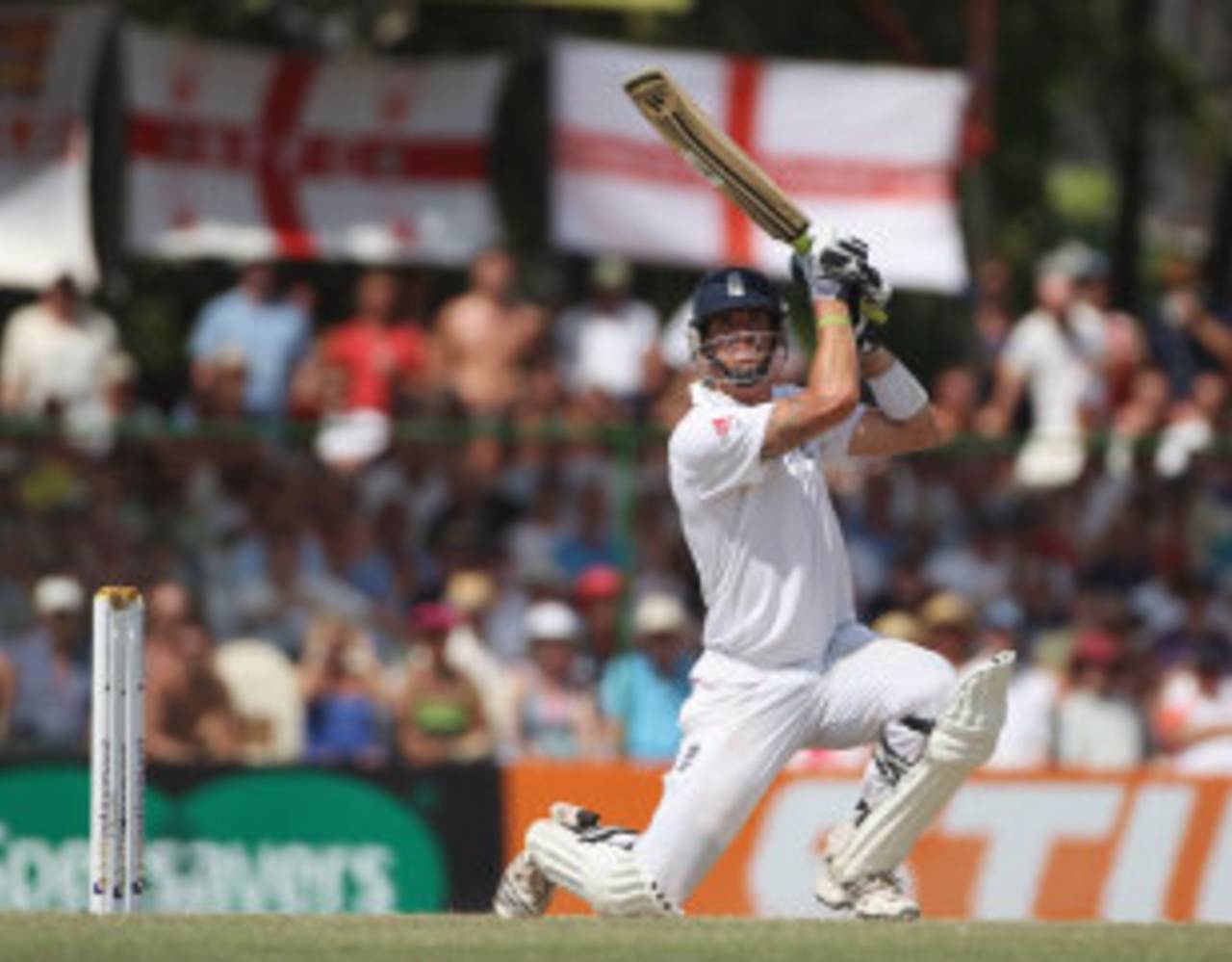"The likelihood is I'm in a position now to go and score some runs." That was
Kevin Pietersen before the first Test in Galle. It wasn't the brash statement it may appear - Pietersen had also admitted he could score four ducks in the series - but after a difficult time in the Tests against Pakistan he was feeling back to his best. Those who watched his magnificent innings at the P Sara saw batting at its most clinical.
Throughout this game England have played much more like the side that reached No. 1 in the world. A strutting, confident Pietersen is part of that package. He is, has been and always will be a remarkable talent. The fact that in 2008 he brought in a shot that sent the lawmakers into conference shows what an impact he has had on the sport. That shot, his switch hit, again came to prominence in this innings but there was so much more about his display.
"When I'm in form I like to play like that," he said. "I've never been able to explain how I bat, it's instinct. I've got a pretty simply technique and have been working on something very simple. It just worked today."
It was his 29th international hundred and set a new record for England, going ahead of Graham Gooch (which puts Sachin Tendulkar's feat into some perspective), and came after a lean time in the UAE where he made 67 runs in the three Tests.
"It's a very proud day for me and my family," Pietersen said. "Records will get broken but I don't want to stop there and I'm so pleased mum and dad were here. There are blokes that have so many more [hundreds] than me. At the end of my career I'll be very proud of the way I've trained and the way I've played. It's stuff that dreams are made of."
He was the first batsman to score freely on a slow surface. Even Mahela Jayawardene had to grind out his runs on the opening day. This was Pietersen from the first part of his career (BC, before captaincy, is perhaps how it should be known) when he was one of most of dazzling batsmen in the world. Since then he has gone through times when batting has been tougher, but he retains that stroke of brilliance that sets him apart.
"After the two months off I found it quite difficult to move my feet quickly," he said about his struggle in the UAE. "I'd like to play those Test matches again playing the way I am now. You can't always score runs and you can't always be in good form. Players go through cycles and you can feel like an idiot. I certainly felt like an idiot in the first couple of Test matches but have turned the corner after a lot of hard graft."
For the first time this year he had the perfect foundation to work from. The top three had taken England to 213 for 2 and the timing of Alastair Cook's dismissal may actually have helped him. The new ball was only four overs old, so there was some hardness for Pietersen to work with rather than having to play himself in against a soft ball. "The stability of the top three is amazing," he said. "The guys laid a platform and in that weather, with bowlers in their third or fourth spells, they can be pretty tired so you have to cash in."
"This was Pietersen from the first part of his career (BC - before captaincy) when he was one of most of dazzling batsmen in the world"
Not that a new ball prevented Mahela Jayawardene going straight away to Rangana Herath although that tactic lasted one over. By lunch Pietersen had 18 off 33 balls and then, like great batsmen can, he decided to flick the switch after the interval. In the second over of the afternoon session he skipped down the pitch and lofted Tillakaratne Dilshan over long-on.
Pietersen has had problems against spin, but rarely ordinary offspin. Suraj Randiv was made to look like a club bowler as the 17 deliveries he bowled to Pietersen went for 39 runs and he had a strike-rate of over 100 against Dilshan. It was a ruthless, calculated assault. The head-to-head with Dilshan turned into an enthralling contest and led to Pietersen being warned for preparing to switch hit too early. Then, after three-and-a-half dazzling hours it ended when he tried to paddle Herath.
"A longer innings would have done us a world of good, but it was so hot out there," he said. "There was no way I could bat until tomorrow. My right hamstring had gone and both my forearms had gone. I think we let ourselves down a bit in that final session, I'm not sure we should have been bowled out but it sets up a fascinating Test match."
Pietersen may have wanted more runs - and a lead of 250 would have all but removed the chance of an awkward fourth-innings target - but another great value of an innings like his is that it buys England time in the match. It is hard work taking wickets on this surface although there are increasing signs of uneven bounce that will encourage the fast bowlers.
This could yet prove a crucial match in the context of the rest of the team's year, not so much for the summer coming up at home but the series against India in November and December. If they can leave the subcontinent with evidence of improvement it will give them something to work with, although the spin bowling on that series should be of a higher quality. That is why Pietersen is so important. He was vital to England reaching No. 1 and he'll be vital if they are to stay there. Innings like this show why.
Andrew McGlashan is an assistant editor at ESPNcricinfo
